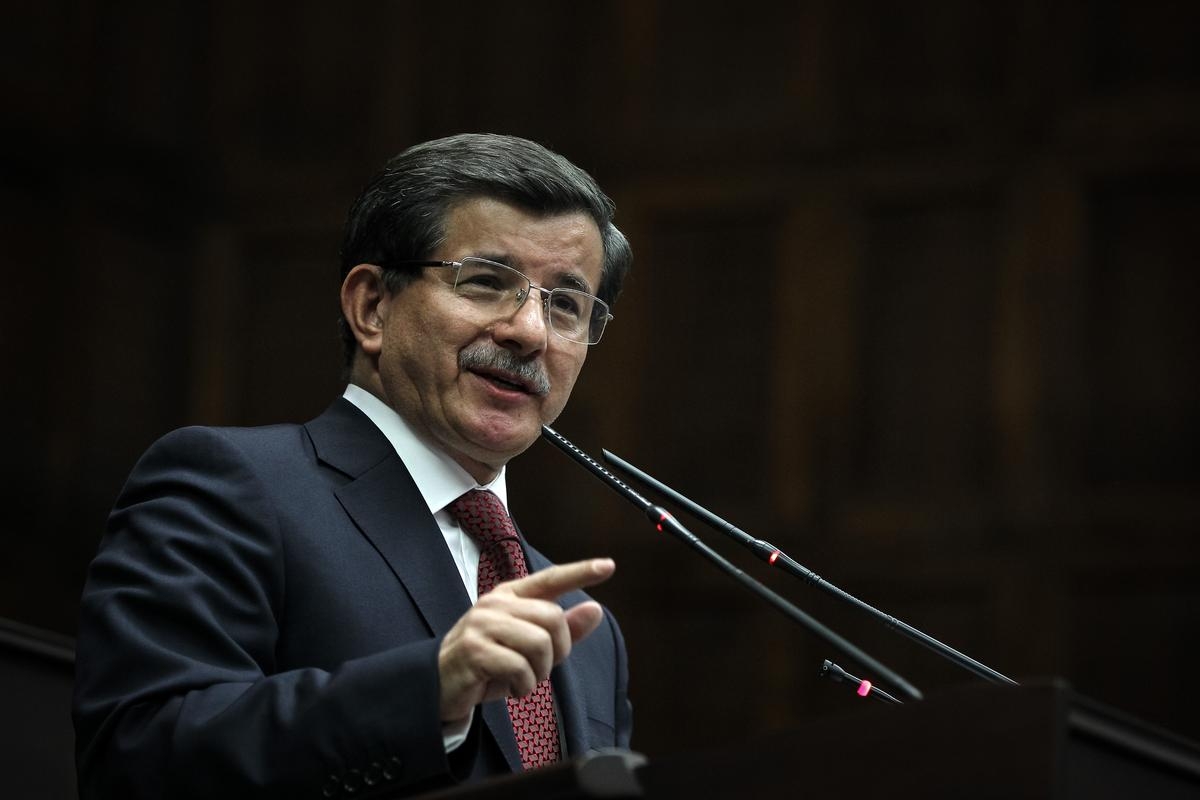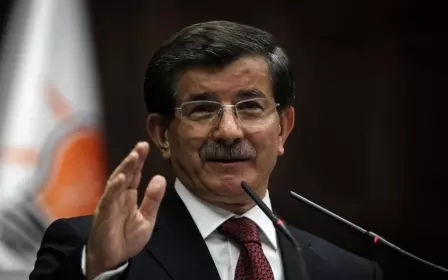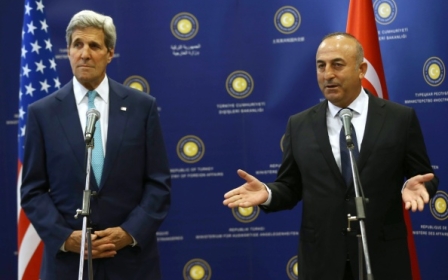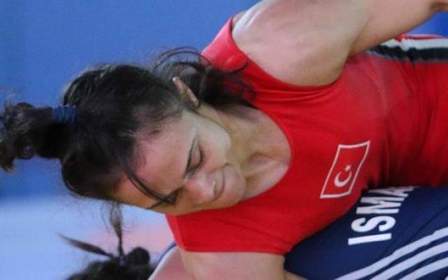Davutoglu government's 'great restoration'

Over the last twelve years, the rule of the Justice and Development Party (AKP/AK Party) had an undeniable impact on the Turkish state and society. Both the election of Recep Tayyip Erdogan as the president, and the appointment of Ahmet Davutoglu as his successor for the prime minister post are being presented as the next step.
These steps, for many, are part of a journey leading towards a long-aspired objective, a transformed state structure. "The New Turkey" campaign, introduced by Erdogan and Davutoglu plays a key role in the future government policy.
During his parliamentary address, Davutoglu spelled out "the era of great restoration", a term that should not be confused with restoring the Ottoman Empire according an anonymous aide of him. It is more likely repairing the basic tenets of the republic that was "injured" for the last 90 years.
Cabinet revision
Though the framework of this "restoration" and "The New Turkey" are still unclear, Davutoglu's choices in the cabinet revision indicate that he prefers to be on the safe side. He has only made a few adjustments, including filling his former post, but he has kept the rest of the ministers.
In that sense, whilst inheriting Erdogan's cabinet as it is and appointing two of the key aides of Erdogan, namely Numan Kurtulmus and Yalcin Akdogan as deputy prime ministers, Davutoglu seems to want to send a message of prolonged political and economic stability to the international community.
He does this by keeping Ali Babacan as the deputy prime minister for economic affairs in order to maintain the economy in check till the general elections in 2015. Babacan was one of the key figures behind Turkey's economic development over the last decade, and especially financial spheres want him to stay.
Also, Davutoglu appointed former minister of the European Union affairs Mevlut Cavusoglu as foreign minister. Volkan Bozkir will take on the EU affairs. These two figures are well known in European diplomatic circles; a rather restrained message that Turkey will not be seeking an adventurous foreign policy - at least till the next general elections.
According to Ahmet Insel at Bahcesehir University, this restraint is an attempt to keep the stability intact for a government that will only endure ten months. "On one hand economic stability plays an important role in electoral success, on the other hand political realities in the Middle East and especially on our borders push Turkey to cling on the EU anchor," Insel told MEE.
Turkey had been facing a clear slow-down in economic growth as well as a long standing impasse in its negotiations to become a full member of the EU. Whilst economic growth was one of the main driving forces behind AKP's success in the last twelve years, joining the EU has been a long-standing objective in Turkish foreign policy, regardless of the governments that took power over the last two decades.
"It is not a coincidence that a significant part of the small cabinet revision relies on individuals who could bring about a positive and effective change in the EU relations," Insel argued.
The stability aspect shall not be underestimated in the wake of the upcoming elections. This time, AKP aims for getting a greater percentage of the vote, basically the required parliamentary majority to unilaterally change the constitution. In order for Erdogan to enjoy full executive powers this is one of the major hurdles to pass.
Perhaps Davutoglu government's strategy should be evaluated within this election game context. There is no place for errors since one single miscalculation might result in failing to secure more than fifty percent of the votes.
Birol Akgun, the president of the Ankara based think-tank, the Institute of Strategic Thinking believes that Davutoglu wants to keep the balance in important matters.
"The new prime minister - unlike some people's claims - is playing the game of reelpolitik," Akgun told MEE. For him this could be seen when looking at his decision to bring relatively liberal individuals to the foreign and EU ministries posts. "He wants to assert Turkey's position in the international arena."
Davutoglu has been criticised for his foreign policy decisions over the last few years, he has also been blamed for dragging Turkey into isolation; even in its immediate neighbourhood.
However, this cabinet balancing also signals a likely change that Turkey could experience in the next era: the shifting mentality in ministerial appointments. Should AKP be elected to form the government again in 2015, Turkey probably would see a whole set of new faces in the cabinet.
The reason for this is twofold: first, it will be the first time that AKP's self-limiting three terms rule will be applied to many party veterans and second, Davutoglu signals a focus on merit, rather than Erdogan's approach on the basis of loyalty.
The "great restoration"
Transforming the state structure is not a new phenomenon. It was already taking place as the AKP consolidated its power during its rule. However, one can track key moments that paved the way.
For Akgun, what we experience today has a semantic connection to the 2007 referendum. "We have come to this point as a result of it. The power distribution within the current system is being redefined. Hence, 'The New Turkey' represents a systemic change."
The systemic change, Akgun argues, is the consolidation of civilian process, and it should be crowned with a new constitution. It is only then that "The New Turkey" will become tangible.
Moreover, this term does not only refer to practicality, but it is also a new attempt to redefine the very essence of the republic. According to Mucahit Bilici, a sociology professor at the City University of New York, "The New Turkey" is the end of the secular Kemalism; the main ideology that was the driving force behind the total transformation of the Ottoman structure to republican ideals. However, for him, this does not mean old tools of the Kemalist regime are totally bygone.
"Today, the government is building a new nation," Bilici argued. "It does so by using some elements of the past; but replacing Turkishness with Islamic identity."
He further added that, today, formerly oppressed religious masses actually have the power to this change. "As a result, the regime reinstates its ideological allegiance against the Kemalist structure."
This project is materialising with confidence boosts, thanks to Erdogan's nine electoral victories. Consequently, after each election, he raised the stakes to set bigger goals and mobilise the masses.
The government now has the power to realise some objectives which would be very difficult to achieve without the current, established rule.
Insel highlighted five important elements which have been discussed in Turkish-Islamist spheres for decades: "a full integration of state and society, the election of the head of state by the nation, the blurring of the boundaries between legislative and executive branches, a majoritarian rule under the name of the national will, and of course redistribution of state resources to the new wealthy," he said.
These five aspects could be considered as the process towards a "New Turkey". However, within this context, the "new" does not necessarily mean a more democratic Turkey. For Insel, "this [The New Turkey] is a new version of traditional authoritarianism."
Yet, Bilici argues that what we experience today is a need for democratising the Muslim nation-state, but the path toward democracy is a work in progress. "In other words, a transition from a situation of sanctifying 'national will' to that of a 'democratic constitution' is required."
He further argued that Erdogan's self-centrist regime delays this transition, resulting in an anomaly between the two orders. "The 'will' is being used as a sledgehammer-like power, without institutional checks," he said.
Perhaps one of the biggest hurdles that AKP government faces is using the concept of "nation-state building". It is a term that belongs to the early 20th century; but for the second time Turkey finds itself on the verge of building a nation-state.
The clues of this new nation-state building could be seen in Erdogan's emphasis on "our civilisation" discourse. For Insel, Erdogan has already been talking about "our civilisation", "but it is only after Davutoglu's government programme we see a systemic project that simultaneously forms the framework of 'The New Turkey.'"
"'Our civilisation' discourse is the expression of anti-Western thoughts or at least a widespread suspicion towards the West by Turkish-Islamist spheres," Insel argued. "They see the 'Westernisation' as a rival, a means of self-colonialism."
However, where Turkey belongs in the international arena is an on-going debate. Whether it is a Middle East or a European/Western country, its ties with both geographies make it difficult to align itself solely with either one.
Under these circumstances, Insel stated, "Turkey's relations with the West is not like of an ordinary Middle Eastern or Muslim country. Turkey is a member of the Council of Europe, NATO, OECD; it is also in the process of joining the EU."
For him, debating "our civilisation and theirs" jeopardises the EU membership prospects and more importantly, it shakes up the government's sincerity. "In other words, the 'our civilization' discourse which is being shaped around the idea of 'The New Turkey' takes us back to the mid 19th century debates on Tanzimat;" these were the first attempts of Ottoman modernisation.
New MEE newsletter: Jerusalem Dispatch
Sign up to get the latest insights and analysis on Israel-Palestine, alongside Turkey Unpacked and other MEE newsletters
Middle East Eye delivers independent and unrivalled coverage and analysis of the Middle East, North Africa and beyond. To learn more about republishing this content and the associated fees, please fill out this form. More about MEE can be found here.




